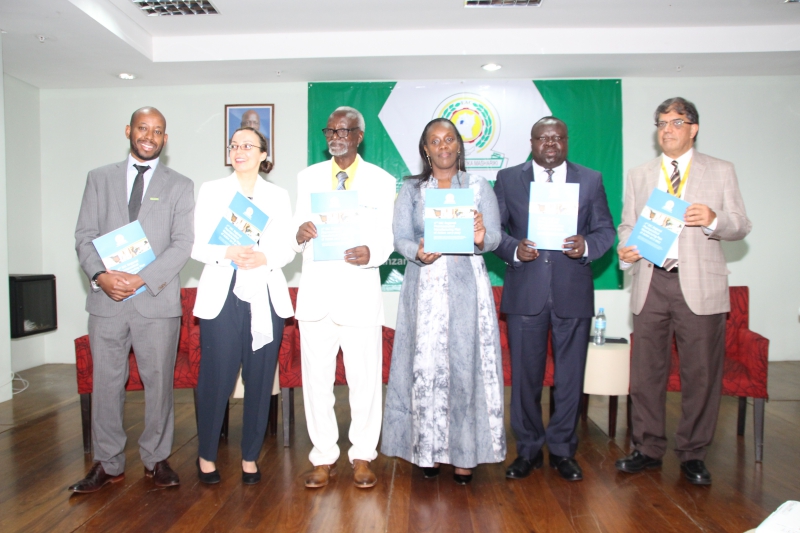
1st EAC Vaccine Production Symposium held in Arusha
East African Community Secretariat, Arusha, Tanzania, 18th April, 2018:
The 1st East African Vaccine Production Symposium kicked off in Arusha, Tanzania today with the Chairperson of the East African Community Council of Ministers, Hon. Dr. Kirunda Kivejinja, disclosing that the Community produces less than 30 per cent of the medicines required by its citizens, while importing the rest.
Hon. Kivejinja, who is also Uganda’s 2nd Deputy Prime Minister and Minister for EAC Affairs, further said that vaccines were among a category of medicines for which the region wholly depends on imports because there was currently no local production capacity.
Dr. Kivejinja, however, pointed out that the EAC had the highest projected pharmaceutical sales growth on the continent estimated at 12.4% over the next five years, a fact which points to immense business and investment opportunities for the private sector.
Hon. Kivejinja said it was worrying that communicable diseases like HIV/AIDS, and diaorrhea which were preventable were among the leading causes of death in the EAC, adding that the statistics for Sub-Saharan Africa were also not good.
“According to the World Health Organisation, non-communicable diseases like cancer, diabetes, heart disease, and chronic respiratory disease are projected to overtake communicable diseases in Sub-Saharan Africa by 2030. Deaths from non-communicable diseases are expected to account for 42% of all deaths by 2020, up from roughly 25% today,” he said.
Hon. Kivejinja also launched the 2nd EAC Regional Pharmaceutical Manufacturing Plan of Action for the period 2017-2027, a plan that he said serve as a roadmap to guide the Community towards evolving into an efficient and effective regional pharmaceutical manufacturing hub.
“We have the need and you have the capacity to satisfy our need,” Hon. Kivejinja told private sector representatives.
He outlined a number of potential niches for expansion of the local product portfolio highlighted in the plan, namely the production of advanced formulations for non-communicable diseases, veterinary pharmaceuticals and development of natural products and traditional medicines.
“The plan also focuses on supporting production of active pharmaceutical ingredients and excipients as well as promoting the sector specific service industry,” he added.
EAC Secretary General Amb. Liberat Mfumukeko, in remarks read on his behalf by the Deputy Secretary General in charge of Productive and Social Sectors, Hon. Christophe Bazivamo, said that the EAC was keen on upscaling its efforts on the transformation of regional economies through value addition, manufacturing and processing in the pharmaceutical sector.
Amb. Mfumukeko noted that compared with other regions on the continent, the pharmaceutical spending in the EAC region was the highest with an estimated current market rate of US$5.3 billion.
“In Africa, the pharmaceutical spending is currently estimated at US$30 billion and this value is driven by a 10.6% compound annual growth rate (CAGR) second only to Asia Pacific (12.5%) and in line with Latin America (10.5%). Spurred by a convergence of demographic changes, increased wealth and healthcare investment and rising demand for medicines to treat chronic diseases, this market potentially represents a US$45 billion opportunity by 2020,” said the Secretary General.
Amb. Mfumukeko said that the region currently suffers from several challenges in pharmaceuticals production including a skills gap in product development and formulation expertise, and lack of appropriate and affordable financing for the sector.
Speaking at the forum, Ms. Asmau Nitardy, the Eastern Africa Regional Director of the German-African Business Association, said that the German health sector offers great potential to meet East African needs in medical technology and pharmaceutical sector.
“Innovative solutions are needed in healthcare infrastructure with the improvement of healthcare systems being an important policy focus in East Africa. The other major trend is the rising demand for medicines and equipment to treat chronic, non-communicable diseases,” said Nitardy.
“German companies are already well placed to cater to both industries having long-standing ties with various East African nations. The high quality of their products technical expertise in training local staff has made German medical companies a valuable partner to local authorities,” she added.
Also present at the event were the Rwandan Minister of Health, Dr. Diane Gashumba, Dr. Dafrossa Lyimo, Head of the Immunization Programme in Tanzania’s Ministry of Health, Dr. Kirsten Focken, the GIZ Programme Manager, and Mr. Nazeem Mohammed, the Chairman of the Federation of East African Pharmaceutical Manufacturers.
-ENDS-
For more information, please contact:
Mr Owora Richard Othieno
Head, Corporate Communications and Public Affairs Department
EAC Secretariat
Arusha, Tanzania
Tel: +255 784 835021
Email: OOthieno [at] eachq.org
About the East African Community Secretariat:
The East African Community (EAC) is a regional intergovernmental organisation of five Partner States, comprising Burundi, Kenya, Rwanda, Tanzania and Uganda, with its headquarters in Arusha, Tanzania.
The EAC Secretariat is ISO 9001:2008 Certified
